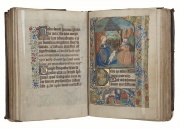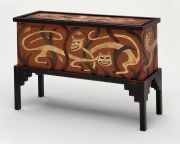Difference between revisions of "Gold leaf"
| (One intermediate revision by one other user not shown) | |||
| Line 1: | Line 1: | ||
| − | [[File:04.1745-SC79853.jpg|thumb|]] | + | [[File:04.1745-SC79853.jpg|thumb|Book of Hours<br>MFA# 04.1745]] |
== Description == | == Description == | ||
Extremely thin sheets of [[gold]] that are used for gilding. Gold leaf has been used since at least 2600 BCE (Hatchfield and Newman 1991). It is prepared by interleaving thin plates of gold between layers of gold-beater's skin which are then hammered until the malleable metal is spread to a fine continuous film thickness of about 0.1 micrometer. Gold leaf is typically cut in 3 inch squares and sold in books containing 25 sheets. Standard gold leaf is 23.5 carat; other types of gold leaf are lemon gold (18.5 carat) and pale gold (16 carat). The latter two are alloyed with silver and are thicker and easier to handle. Gold leaf is used for gilding furniture, frames, and plaster. It is also used for gold lettering and other types of decoration. | Extremely thin sheets of [[gold]] that are used for gilding. Gold leaf has been used since at least 2600 BCE (Hatchfield and Newman 1991). It is prepared by interleaving thin plates of gold between layers of gold-beater's skin which are then hammered until the malleable metal is spread to a fine continuous film thickness of about 0.1 micrometer. Gold leaf is typically cut in 3 inch squares and sold in books containing 25 sheets. Standard gold leaf is 23.5 carat; other types of gold leaf are lemon gold (18.5 carat) and pale gold (16 carat). The latter two are alloyed with silver and are thicker and easier to handle. Gold leaf is used for gilding furniture, frames, and plaster. It is also used for gold lettering and other types of decoration. | ||
| − | [[File:1991.444-SC73193.jpg|thumb|]] | + | [[File:1991.444-SC73193.jpg|thumb|Leopard Chest<br>MFA# 1991.444]] |
== Synonyms and Related Terms == | == Synonyms and Related Terms == | ||
| Line 10: | Line 10: | ||
goldleaf; gold foil; feuille d'or (Fr.); Blattgold (Deut.); hoja de oro (Esp.); bladgoud (Ned.); folha de ouro (Port.) | goldleaf; gold foil; feuille d'or (Fr.); Blattgold (Deut.); hoja de oro (Esp.); bladgoud (Ned.); folha de ouro (Port.) | ||
| − | == | + | == Resources and Citations == |
| − | P.Hatchfield, R.Newman, "Ancient Egyptian Gilding Methods" in ''Gilded Wood. Conservation and History'', Sound View Press, Connecticut 1991. | + | * P.Hatchfield, R.Newman, "Ancient Egyptian Gilding Methods" in ''Gilded Wood. Conservation and History'', Sound View Press, Connecticut 1991. |
| − | |||
| − | |||
* Thomas Gregory, ''The Condensed Chemical Dictionary'', Reinhold Publishing, New York, 3rd ed., 1942 | * Thomas Gregory, ''The Condensed Chemical Dictionary'', Reinhold Publishing, New York, 3rd ed., 1942 | ||
Latest revision as of 14:21, 21 August 2020
Description
Extremely thin sheets of Gold that are used for gilding. Gold leaf has been used since at least 2600 BCE (Hatchfield and Newman 1991). It is prepared by interleaving thin plates of gold between layers of gold-beater's skin which are then hammered until the malleable metal is spread to a fine continuous film thickness of about 0.1 micrometer. Gold leaf is typically cut in 3 inch squares and sold in books containing 25 sheets. Standard gold leaf is 23.5 carat; other types of gold leaf are lemon gold (18.5 carat) and pale gold (16 carat). The latter two are alloyed with silver and are thicker and easier to handle. Gold leaf is used for gilding furniture, frames, and plaster. It is also used for gold lettering and other types of decoration.
Synonyms and Related Terms
goldleaf; gold foil; feuille d'or (Fr.); Blattgold (Deut.); hoja de oro (Esp.); bladgoud (Ned.); folha de ouro (Port.)
Resources and Citations
- P.Hatchfield, R.Newman, "Ancient Egyptian Gilding Methods" in Gilded Wood. Conservation and History, Sound View Press, Connecticut 1991.
- Thomas Gregory, The Condensed Chemical Dictionary, Reinhold Publishing, New York, 3rd ed., 1942
- Ralph Mayer, A Dictionary of Art Terms and Techniques, Harper and Row Publishers, New York, 1969 (also 1945 printing)
- Hermann Kuhn, Conservation and Restoration of Works of Art and Antiquities, Butterworths, London, 1986
- Matt Roberts, Don Etherington, Bookbinding and the Conservation of Books: a Dictionary of Descriptive Terminology, U.S. Government Printing Office, Washington DC, 1982
- The American Heritage Dictionary or Encarta, via Microsoft Bookshelf 98, Microsoft Corp., 1998

